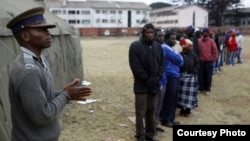The Zimbabwe Election Support Network (ZESN), which observed the weekend Nkulumane parliamentary by-election won by Zanu PF, says it is worried that the Zimbabwe Electoral Commission (ZEC) used two voters’ rolls – one with over 13,000 people and another with more than 20,000 voters.
In a statement, ZESN said this is not acceptable in a democratic society as only one voters’ roll is utilized in free and fair elections.
The by-election was held to fill a seat left vacant after the death of MDC-T lawmaker Thamsanqa Mahlangu. All MDC formations boycotted the polls that featured Zanu PF and two small opposition parties.
According to ZESN, ZEC registered voters in Nkulumane using the polling station-based voter registration system which was recently piloted in the Marondera Central by-election.
“ZESN observers reported on the use of two voters’ rolls namely the main polling station-based voters’ roll which had names of those who managed to register anew during the November 2015 registration exercise in the constituency and a supplementary polling station-based voters' roll which was extracted from the 2013 ward based voters’ roll. ZEC used two voters’ rolls for the Nkulumane by-election.
“This becomes the second time that the Commission has utilized two separate voters rolls (main and supplementary rolls) under the polling station based voting system prompting some stakeholders to raise questions over ZEC preparedness to fully implement the system for the 2018 harmonised elections.”
ZESN reiterated its position that international best practice encourages the use of a single voters’ roll in order to enhance stakeholder confidence.
The main voters’ roll for Nkulumane had a total of 13,331 registered voters of which 5,121 were male (38%) and 8,234 (62%) female. The supplementary voters’ roll had 20,787 voters of which 11,071 (53%) were males and 9,715 (47%) females.
ZEC chairperson Rita Makarau was not available for comment. According to ZESN, counting procedures were conducted in accordance with the law with all political party agents confirming by signing the V11 forms at the end of the counting. “In line with the requirements of the law the election results were posted outside all polling stations where ZESN observed.”
ZESN observer reports show that the turnout was generally low with voters trickling in throughout the day. Most of those who turned out to vote were mostly women with a significantly low number of youths turning out to cast their votes. “The low voter turnout for the Nkulumane by-election is consistent with trends during all the 2014 and 2015 by-elections. These trends may be attributed to the fact that major opposition political parties have not participated in the by-elections, and also the timing of this by-election which coincides with the festive season where people travels to different holiday destinations. Another contributing factor could be that the by-election was held during the festive season.”
ZESN recommended that government should speed up alignment of electoral-related laws with the Constitution to ensure the creation of a conducive electoral environment that guarantees the respect and enjoyment of universal suffrage and fundamental freedoms.
It also suggested that the continued use of two voters’ rolls reveals the need for ZEC to come up with a more comprehensive voter registration methodology that ensures that all eligible voters are captured by the new polling station based voter registration system.
ZESN also said ZEC should devise voter education programmes that lure the youth and other voters in general to fully participate in electoral processes.




